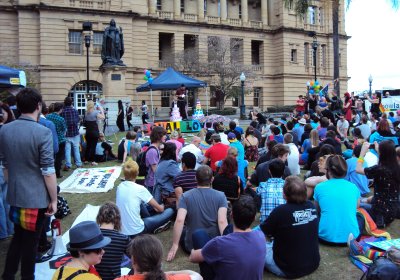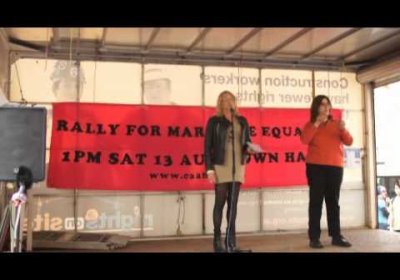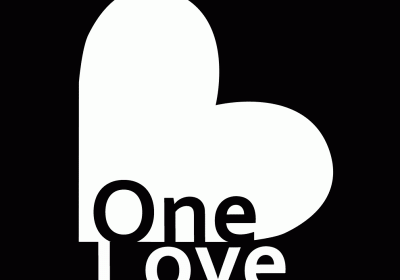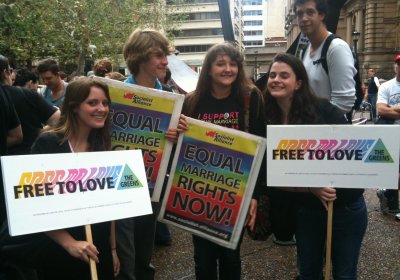Community Action Against Homophobia released the statement below on September 9.
* * *
In August, Greens Senator Sarah Hanson-Young wrote an opinion piece in The Age arguing that “the fight for marriage equality should be above party politics, which is a vital reason to give members of parliament a conscience vote on the matter”.
LGBTIQ
Fundamentalist Christian street preachers faced stiff opposition from activists who rallied against their public sermons in Adelaide’s Rundle Mall on September 2.
Members of the right-wing religious group found themselves surrounded by a large crowd of activists who rallied for more than five hours.
The rally’s theme was “love not hate”.
The rally aimed to show solidarity for those who have received verbal abuse and suffered violence, particularly homosexual youths often targeted by the fringe Christians.
The issue of marriage equality is steadily gaining traction among the Australia population. Seventy-five percent of Australians expect same-sex marriage to be made legal a 2011 Galaxy Poll found.
The same research said 62% of Australians support marriage equality; the number is as high as 80% among younger people. The poll also said 78% of Australians believe there should be a conscience vote in parliament on the issue.
Australian Marriage Equality released the statement below on August 16.
* * *
Christian leaders join campaign for equality.
A national opinion poll has found a majority of Australian Christians believe same-sex couples should be allowed to marry and several mainstream Christian ministers have spoken out in favour of the reform.
Up to 400 people gathered in Queens Park here on August 13, as part of a national day of action for equal marriage rights.
The rally and march that followed were called for the seventh anniversary of the former Howard government's 2004 ban on lesbian, gay, bisexual, transsexual and intersex (LGBTI) people's legal right to marry.
Protesters rallied across Australia on August 13 in support of equal marriage rights. In Sydney, protesters gathered at Town Hall.
On August 7, 50 sex and gender diverse and transgender people gathered in Petersham in Sydney’s inner west at a “Save the Drop-In” BBQ. The event was in response to the Gender Centre — the only community service provider for transgender people in Sydney — closed a cornerstone of its service: the weekly “Drop-In” service.
The drop-in attracted about 40 people each week. It was held in the evening and food was provided. The service accounted for 28% of the Gender Centre’s client contacts, according to the Centre’s 2010 annual report.
Resistance will host the Melbourne campaign launch for Wear It Purple on August 27.
Wear It Purple is an organisation which looks out for the interests of young people who identify as lesbian, gay, bisexual, transgender and intersex (LGBTI), and runs numerous campaigns around homophobic bullying, particularly in high schools.
The organising collective for December’s “1Love: equality, marriage, freedom” conference in Sydney released the statement below on August 11.
* * *
The first national conference to discuss the future and direction of the marriage equality campaign has been announced.
The grassroots campaign for marriage rights has been a great success to date — we have won civil unions in the ACT, three registration schemes and recognition of international same-sex marriages in Tasmania.
Ten countries and nine jurisdictions in the world have recognised marriage equality since 2001. Many other parts of the world recognise civil unions, registration schemes or same-sex marriages performed outside of the respective country.
Australians are ready to follow suit. Seventy-five percent of Australians expect same-sex marriage to be legalised, said a 2011 Galaxy Poll.
Over the July 9-10 weekend, the New South Wales Labor conference failed to produce a motion in support of equal marriage rights. The conference instead voted to send the decision to the ALP national conference that is to be held in December.
This motion passed despite the fact that all other ALP state conferences have passed motions in support of reforming the law to grant equal marriage rights. It also came two weeks after New York legalised same-sex marriage on June 24.
In the predominantly Roman Catholic city of Manila, a small group of Metropolitan Community Churches (MCC) are preaching a message of inclusion and social justice that has angered the religious hierarchy.
Now, their practice of blessing same-sex marriages has resulted in leaders of the Catholic Church in Manila threatening legal action, and calling for MCC to be stripped of its right to solemnise marriage ceremonies.
On June 25, the MCC of Metro Baguio hosted a Holy Union of eight same sex couples at the Ayuyang Bar in Baguio City.
- Previous page
- Page 39
- Next page










